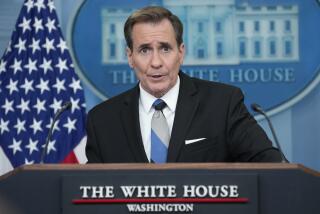U.S. Plans to Lift Economic Curbs Against Poland
- Share via
WASHINGTON — The Reagan Administration is planning to lift its remaining economic sanctions against Poland, ending a policy that has been in effect since martial law was imposed in that country more than five years ago, an Administration official said Tuesday.
The policy reversal “has been under review” for several months, said the official, who was not certain whether a final decision has been made on the timing of the announcement.
However, the White House has been “moving in that direction,” said the official, who spoke on condition of anonymity. He added that the Administration could make an announcement as early as this week, when President Reagan meets Thursday with leaders of the Polish-American community.
Deputy Secretary of State John C. Whitehead was sent to Warsaw several weeks ago to discuss the sanctions issue with Polish leader Wojciech Jaruzelski, as well as with Lech Walesa, who founded the Solidarity labor union, and Cardinal Jozef Glemp, the nation’s Roman Catholic primate. Whitehead, the No. 2 official at the State Department, recommended that the sanctions be lifted when he reported back to Washington, officials said.
Some economic sanctions have already been repealed, but key measures remain intact, including a ban on new U.S. credit guarantees and suspension of “most-favored-nation” trade status, which provides the same low tariffs that apply to most non-Communist nations. The only Communist nations that now hold this trade status are Romania, Hungary, Yugoslavia and China.
Although the U.S. action was taken against Poland initially to protest the 1981 declaration of martial law, which was later lifted, the Administration began to seriously reconsider its policy after appeals by such government critics as Walesa and Glemp, as well as reported actions on human rights issues by the Warsaw regime.
Last September, Poland released more than 200 political prisoners in a move aimed at improving the nation’s image on human rights. At that time, Administration officials said that a lifting of U.S. economic sanctions would almost certainly follow at some point, but only if the Warsaw regime adhered to its promise of true amnesty for those released.
The possibility of lifting the sanctions was under consideration as early as last October, when a State Department official said the Administration was weighing the move as a result of the Warsaw government’s amnesty for political prisoners.
But some in the Administration were skeptical of the Polish amnesty. One official, for example, recalled that many of the dissidents released under earlier amnesties were later arrested. At that time, this official said the Administration wanted to ensure that this would not recur before taking any action on the sanctions.
Pushing for the lifting of the sanctions, The Polish Communist Party newspaper Trybuna Ludu said after the release, “We have the moral right to expect elementary compensation in the form of a restoration of normal (economic) relations” with the United States.
Impact Uncertain
The overall economic impact of any U.S. change in policy is uncertain. Although the original action threatened to devastate the Polish economy when taken in concert with other nations, many other countries have since lifted their own sanctions.
Nevertheless, the Warsaw government has estimated that the U.S. sanctions have cost the already-strained Polish economy about $15 billion, about half of the country’s pressing $31-billion debt. Poland’s exports to America are estimated to have fallen from $450 million in 1980 to about $250 million in 1985.
More to Read
Get the L.A. Times Politics newsletter
Deeply reported insights into legislation, politics and policy from Sacramento, Washington and beyond. In your inbox twice per week.
You may occasionally receive promotional content from the Los Angeles Times.










